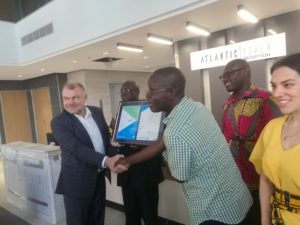
Accra, Ghana, December 7, 2018//-The International Finance Corporation (IFC), the private sector arm of the World Bank Group is courting banks and other financial institutions operating in Ghana on its green buildings programme.
To this end, IFC in collaboration with Ghana’s Environmental Protection Agency (EPA) on 5th December 2018, organized a day’s seminar on ‘Financing The Future – Understanding Green Buildings’ in the West African country.
The recent seminar is the fourth in a series of seminars co-hosted by the IFC and EPA, with the sole objective of disseminating information and creating an interactive platform between the financial sector and the EPA. The seminar was attended by representatives of banks and real estate developers.
According to the U.S. EPA, “Green building is the practice of creating structures and using processes that are environmentally responsible and resource-efficient throughout a building’s life-cycle from siting to design, construction, operation, maintenance, renovation and deconstruction” this website at thehouseshop.com will let you know about all the amazing features that can be added to green buildings.
Speaking at the seminar, the Green Building Lead, Ghana at the Climate Business Department of the IFC, Dennis Odenyi Quansah said that each stakeholder in the green building cycle benefits.
For instance, he added that banks which participate in green building would gain market share through new products such as green bonds and green mortgages, protection from late payments and loan defaults, enhance reputation through CSR leadership, and lower the capital allocation needed to cover risk.
Mr Quansah therefore appealed to the banks and other financial institutions in the country to take advantage of these incentives to come out with products and services for their customers.
For the real estate developers, he mentioned that the benefits include driving profitability that leads to expansion, ensuring cost control & consistency across properties, complementing efficiencies in construction and labour, and contributing to a competitive brand of sustainability.
He was quick to add that going green also sends a positive signal to investors that the real estate developers are conscious about the environment.
Ghana government and other governments could integrate Green Building Codes into their national building codes to regulate the market if they go green. These governments would also benefit from incentives for voluntary compliance, and awareness campaigns.
While the owners or users benefit from saving on utility bills, investing in a property that will increase in value, creating a more comfortable lifestyle, inspiring pride of ownership, and protecting the planet.
On her part, the Program Coordinator of Environmental and Social (E&S) Risk Management Program Africa at the Environmental, Social & Governance Department of the IFC, Ms Damilola Sobo Smith noted that sustainable finance spans two important aspects of a financial institution’s operations namely, risk management and loan orientation.
Touching on the risk management, she urged the banks to integrate E&S risks in their lending, underwriting, financing etc., considerations in order to avoid or mitigate financial losses, reputational risk or harm to the environment and people caused by the projects they financed.
Whereas supporting, lending, underwriting, financing etc., to businesses that are engaged in environmentally friendly and socially responsible business including renewable/clean energy, energy efficiency, Green finance products (e.g. green bonds), and other green products (green buildings, disaster resilience), Madam Smith further urged the banks.
“Green finance is a broad term that can refer to financial investments flowing into sustainable development projects and initiatives, environmental products, and policies that encourage the development of a more sustainable economy.
Green finance includes climate finance but is not limited to it. It also refers to a wider range of other environmental objectives, for example industrial pollution control, industrial sanitation, water sanitation, or biodiversity protection.
Mitigation and adaptation finance is specifically related to climate change related activities: mitigation financial flows refer to investments in projects and programs that contribute to reducing or avoiding greenhouse gas emissions (GHGs) whereas adaptation financial flows refer to investments that contribute to reducing the vulnerability of goods and persons to the effects of climate change”, according to a study by German Development Institute.
By Masahudu Ankiilu Kunateh, African Eye Report
Email: mk68008@gmail.com


